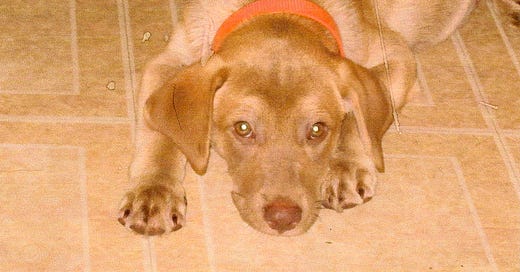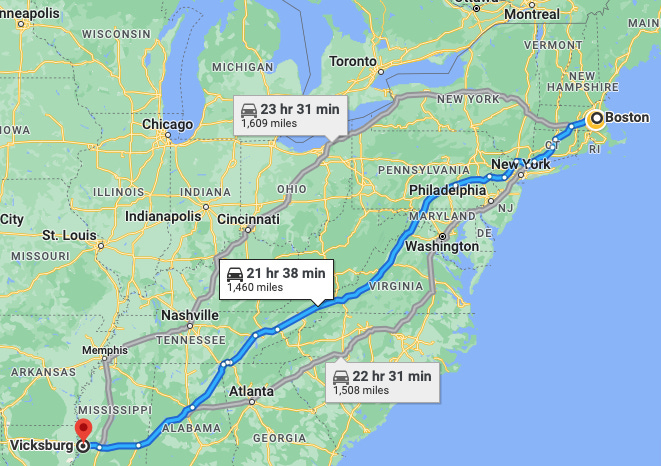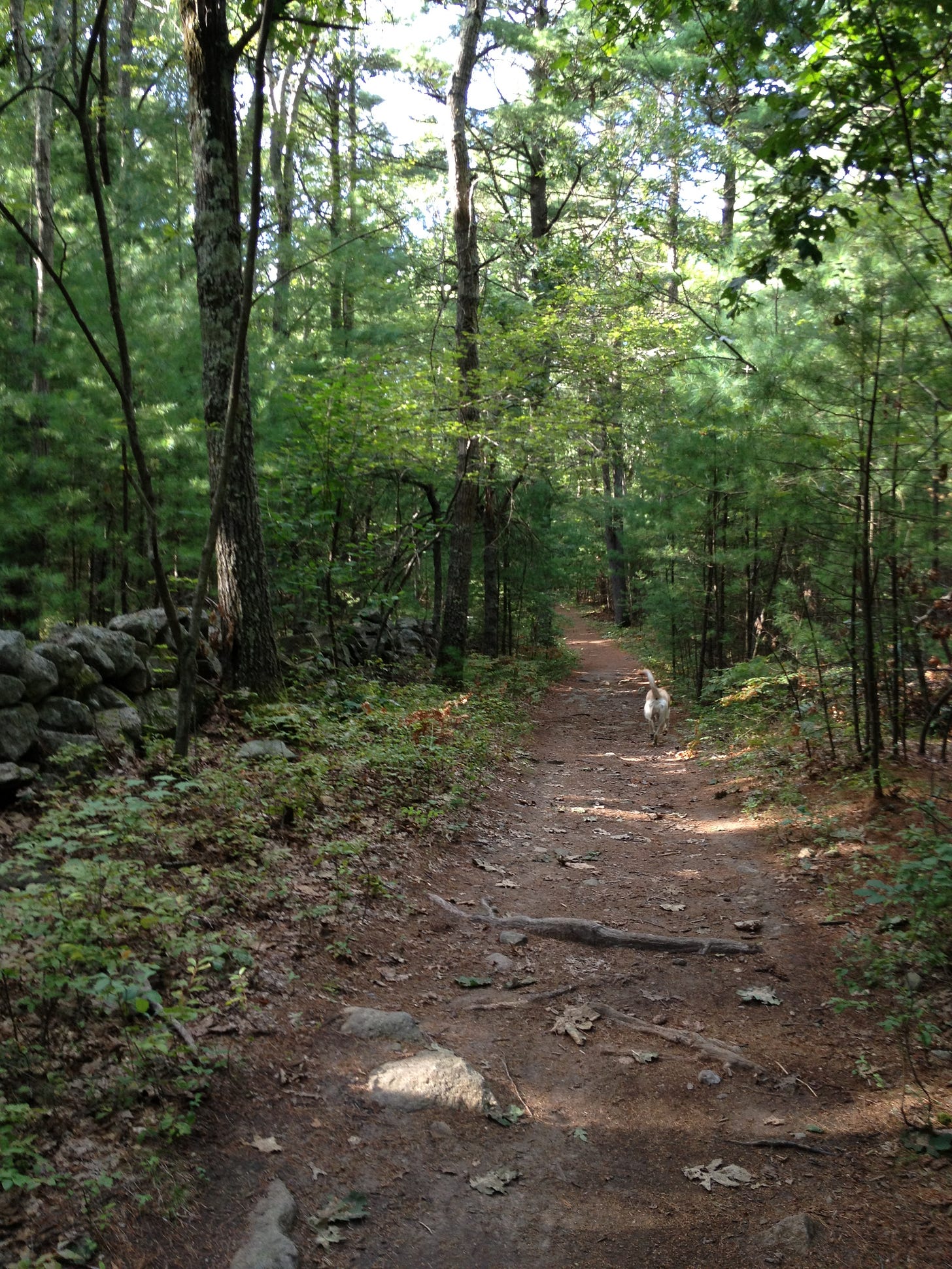Kerry, my wife, and I have different circadian rhythms. She is the early bird, I am the night owl.
Since I rarely go to bed before midnight, I have a couple of hours to fill. We are most creatures of habit in our rising and our setting, so I do the same thing most nights. I become Netflix Numb. I watch old TV shows that don’t strain my brain. I read a little — nothing heavy, just some formulaic mystery. And then, droopy-eyed, I say:
“It’s time to call it a day.”
I say that now to myself, in silence.
But until last spring, I said it out loud to our dog, mutt but mostly Lab, Ulee, who was usually sleeping not far from my feet. He knew those words were his cue: one last spin in the yard, a treat from the magic white box that lights up when opened in the kitchen.
Then we’d walk together down the hall to the bedroom, accompanied by the syncopated rhythm of his nails on the hardwood floor. Once in the bedroom, he’d jump — all seventy-five pounds of him — up into the bed and wait. He would wait to see where my legs would go, so he could split the difference between Kerry and me.
This was his post, his job. Once settled in, he’d yawn, just like a human, and drift off into a sleep that, I imagine, was filled with chasing rabbits, and having his belly rubbed, but mostly about hamburgers accidentally falling off the kitchen table.
It’s been six months since we had to put him down. If I had to write something for his imaginary tombstone, it would be: “You Lucky Dog.”
He was found on the streets of Vicksburg, Mississippi, just a few months old, abandoned. A kindly woman took him in and nursed him back to health. She eventually turned him over to a Rescue organization and from there he made the trip north where, a few months later, we adopted him.
We had thirteen and a half good years with Ulee, who—in case you’re wondering if he was Swedish—was named after Ulysses S. Grant by the woman who found him. Grant had taken Vicksburg in the Civil War, the same day that the battle of Gettysburg was won. Since this woman was from the north, a Yankee, she thought the name “Ulysses” a good poke in the eye to her Confederate flag-waving neighbors.
Tucked into that thirteen and a half years was a half year of things being not so good. Arthritis, anxiety, breathing problems: he, Ulee, literally had his own account at CVS:
Kerry and I have always had a dog, sometimes two at one time, since before we were married. They all, like Ulee had long dog lives—three lived to be fourteen, one fifteen. All were great dogs.
Like with your children, it’s really not a good idea to have “a favorite” dog. But this guy had a special place in time. I was late middle-age when we got him, into Social Security age when he died.
When our other dogs shuffled off their mortal coil, there was always—even though the thought may have been subconscious—the possibility of resurrection. The strain of hospice-like care that all old dogs require cauterizes the wound of loss — a bit. And there is always the prospect of one day, when grief has lessened, to think about a puppy. New life! Roll away the stone! Stock up on paper towels!
This time, however, there will be no resurrection. For practical reasons: take our track record with long-lived dogs, hold it up to an actuarial table, and you get this fact: a puppy would likely outlive me.
I have learned a lot from always having a dog:
The cycle of life and death, the embryonic sense of responsibility that prepares one for having a child, the joy of unconditional love. That last one is probably the reason why people and dogs have been in a symbiotic relationship for 30,000 years.
Against my better judgment, before I “called it a day” one night last week, I went on to the Forever Homes Rescue site—the very place where we had found Ulee fourteen years ago.
I wasn’t looking for a puppy — honestly, you’ll have to believe me on this.
Maybe I was trying to re-live the experience of finding the perfect dog those fourteen years ago.
All that came of it was that I had trouble falling asleep: I kept thinking about all the five and six year-old dogs on the site, dogs with behavioral problems, still not house-trained, that I knew would never be adopted.
When I was working in a parish, kids would sometimes ask me if dogs go to heaven. (And cats, too — just so I don’t get hate email. And, while I’m at it, we still have cat. Who hates me.)
I would always answer yes. Not because I believed in heaven or believed that dogs (and cats) have souls. But because I believed in unconditional love. As a human, that’s something I’m still working on.
All the world’s major religions speak of approaching relationships unconditionally. Because when we enter something unconditionally, we enter it ego-less. I’m not going to say something as absurd as “Everything I Know I Learned From A Dog.” (Although you can find dozens of books with this title on Amazon, as well as accompanying tee-shirts and mugs.)
If everything I learned was from a dog, then I would eat grass, smell people’s butts, and think the world was ending every time there was a thunderstorm.
But living with a dog (we don’t “own” them) has given me a small piece of the puzzle, a hint at the riddle of life.
For which, I guess, I am a lucky dog.
And a song before I go.
If you get it, no explanation necessary. If you don’t, no explanation will do.
Thank you for reading!
If you’d like to share this Stack with someone, click here:
And if you received this newsletter from someone else and are not a subscriber and would like to receive “Words & Music” for FREE, fill in the info below:










Like you John and I always had dogs. We made the decision before we sold house and retired that after our last dog passed we would not adopt again. While that was the right decision for our life style we are sorely tempted all the time. John especially struggles with dog envy and gets a petting/snuggle fix when ever he can. RIP Ulee